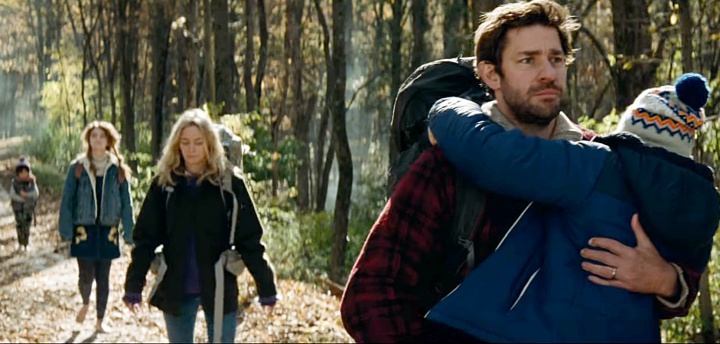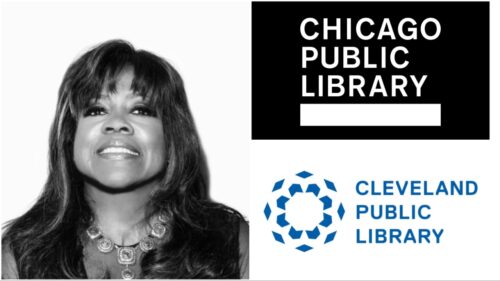Parenting can be scary, even without aliens that snatch people away at the slightest sound, as in the 2018 horror film “A Quiet Place.” Director John Krasinski, who co-wrote the screenplay and starred in the film, never shied away from describing it as a metaphor for parenting. “If anything, it was about going into the dark and taking a chance when all hope looked lost—you fight for what’s most important to you,” he’s said. A 4K steelbook version of his smash-hit film comes out tomorrow, and its highly-anticipated sequel lands next week. Something about this metaphor is connecting with people.
Perhaps it’s that there’s a deeper level to it, much like the space under the floorboards where Lee Abbott (Krasinski), his wife, Evelyn (Emily Blunt), and their children sleep, hidden from the creatures who sent the world as they know it off the rails. With a mattress over their entry hatch muffling any sounds, the parents whisper to each other: “Who are we if we can’t protect them?” The fear in Evelyn’s voice, the apprehension in her and Lee’s eyes—those are the other quiet places in this movie. Those moments parents recognize as times when you hide where you’re scared witless.
I first saw behind this curtain when my parents and I had one of those “remember when” moments about a vacation to Virginia when I was nine. I’d rolled over into the nightstand, scraping my gums, and needed stitches. My dad had taken me to the ER while my mom paced the hotel with my younger brother. While I’d screamed and cried, Dad had complimented the doctor’s handiwork (“That’s a nice one, Doc”). It took about 20 years for him to confess that … guess what? That night, after I’d fallen asleep, he’d thrown up in the bathroom, more worried about me than he’d dared to show in the moment.
Now that my husband and I are parents, we do the same sort of improv. It may not be horrifying once you’re an adult to know that parents and caregivers are human, but as children, the horror that they don’t have all the answers is a secret seldom revealed, if at all.
“A Quiet Place Part II,” released later this month, expands the Abbotts’ world as they recall the initial invasion, meet other survivors, and cope with grief. Krasinski, who is married to Blunt, has said that he connected with the initial script by Bryan Woods and Scott Beck in part because he and Blunt had just had their second child. The first film’s “promise that you make to your kids that I’ll keep you safe no matter what—that’s inevitably a false promise,” he’s said.
I say that promise is an open secret. Lee and Evelyn know it’s false and do it anyway—like a lot of us do—so their kids can survive. Horror films like to capitalize on our anxiety that we can’t think of everything. But “A Quiet Place” goes beyond that, peeling below that earnest exterior to show those little moments where you let down your guard and feel vulnerable, flawed, and helpless.

The first film had scant details about the clawed beasts that now roam the Earth, hunting by sound. “Stay Silent. Stay Alive. Get Underground,” say headlines from news clippings in the basement workshop where Lee sets up security monitors to watch their farm. He, Evelyn, and their children walk barefoot along sand trails and eat from lettuce leaves to avoid the clink of plates and cutlery. Their daughter, Regan (Millicent Simmonds, “Wonderstruck”), is deaf, so they communicate largely through sign language. At night, Lee and the neighbors light fires atop silos and roofs, marking who’s still alive.
But no one thinks of every possibility. In the film’s first ten minutes, the monsters snatch away their younger son Beau (Cade Woodward) during a trek into town for medicine for their older son, Marcus (Noah Jupe, “Suburbicon”). The pain casts a long shadow. Roughly a year later, Lee cries alone on the silo’s roof and burns mementoes of the boy. Regan blames herself for not protecting him.
Meanwhile, Evelyn is pregnant again. She comes up behind Lee in the workshop and tugs him to his feet to dance with her, sharing a set of earbuds. “Come a little bit closer, hear what I have to say,” sings Neil Young. They gaze into each other’s eyes, both of them more tremulous than romantic. How in the world will they protect a newborn?
In their sleeping space under the floorboards, Lee builds a small box for the baby’s bed, complete with an oxygen mask and a lid should the creatures skulk nearby.
Meanwhile, Evelyn whispers what-ifs. “I should have carried him,” she says of Beau.
“You have to stop,” he says.
I recognize the fear in those whispers. I was about four months pregnant when I was laid off from my job as a journalist. A month later, we learned that our son had spina bifida, a birth defect where the spine doesn’t form correctly, typically causing some paralysis. We digested statistics and any information we could find, met with families from a spina bifida support group, and prayed harder than we ever had for anything. We were stricken all the same when our son was whisked away to the NICU right after birth. First came spinal surgery, then brain surgery to install a shunt to alleviate extra cerebrospinal fluid in his head, followed by three weeks in the hospital to treat an infection. He needed a special line near his heart for antibiotics because the medicine was too strong for the little veins in his hands.
I wanted to go home to some kind of normalcy, with the nursery we’d decorated and boxes of diapers and baby gadgets we didn’t know yet how to use. Then I’d feel tremendously guilty for feeling overwhelmed. My husband said he didn’t know what to do, either, but he tried to act like he thought a dad would, a “fake it till you make it” kind of thing.

I recognized that in Lee and Evelyn, how they reassure their children. “Your father will always protect you. Always,” Evelyn tells Marcus when Lee wants to take the boy fishing.
“There’s nothing to be afraid of,” Lee adds.
“Of course there is,” Marcus replies.
On that outing, before they head home, Lee takes Marcus to a waterfall and yells. Marcus jumps at the sound of his dad’s voice, drowned in the rush of water.
“You’re all right. Promise,” Lee says, and they whoop and scream, letting off steam.
You muster your courage because someone has to be the grownup, letting your insecurities breathe in the quiet spaces. Then you figure out the other secret: It isn’t ‘fake it till you make it’ but ‘act like you want it and wish it to be’.
When I learned how scared my dad had been when I’d needed stitches, I felt such a rush of love for him. I never doubted that he loved me, but knowing he’d been vulnerable, a crack in that sturdy exterior that he’d hidden for my sake, meant the world to me.
Our son is now ten. He’s a bright fourth grader who makes the honor roll, loves video games, superheroes, and silly jokes, walks with leg braces and forearm crutches, and also uses a wheelchair. He had his most recent shunt surgery about a week after his ninth birthday. His head had hurt, a sign of building pressure, and at first I’d gone to the pediatrician, thinking—hoping?—that he could have a headache like the rest of us without it being anything serious. He’s had sinus trouble and tummy bugs, after all. But then the headache wouldn’t ease, and we were in the ER again, my husband and I exchanging looks in the hallway while a neurosurgeon explained what lay ahead.
You’ve been through this before, we told our son. The doctors know what they’re doing. You’re in good hands. Lots of kids go to the hospital. Did you know I went to the hospital for stitches when I was your age?
He’s fine once again, thank goodness. He’s back to chatting about the intricacies of “Super Mario Bros.,” dipping Happy Meal fries and apples in sweet and sour sauce, and drawing through a ream of paper at the coffee table. I hate to think he’ll have other surgeries in his future. I guess we’ll cross those moments when we meet them. For now, I’ll hug him tight, kiss his cheek goodnight, and snuggle into his shoulder or his hair for a few extra moments. He’ll smell like bath soap or shampoo or sweetness, and I love him so much, my heart feels full to burst.
Will he sense when we fake it? I think he does already. He’s just grateful we pretend, like I was, creating for them a quiet place that feels safe.











